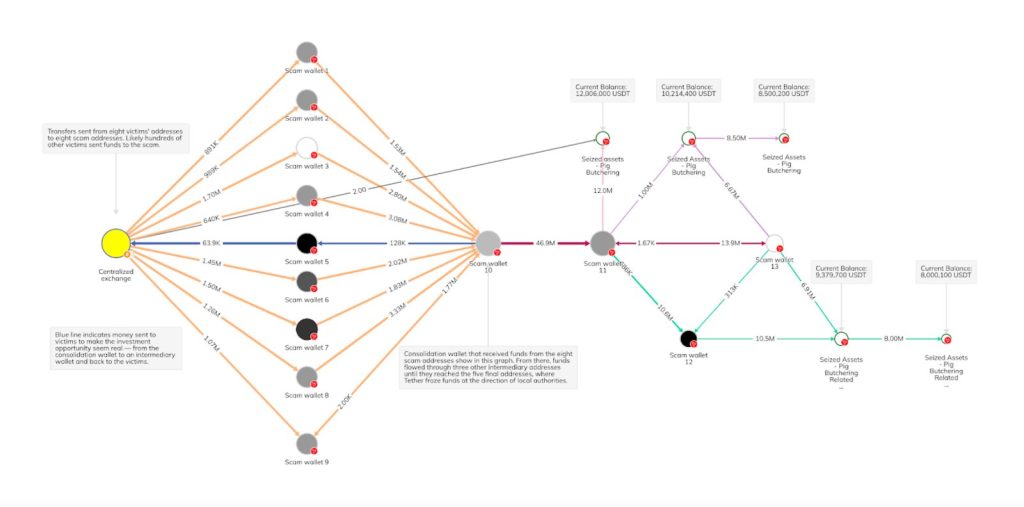
Stablecoin issuer Tether has frozen nearly $50 million in USDT tied to a Southeast Asia-based “pig butchering” scam in a joint operation with blockchain intelligence firm Chainalysis, crypto exchanges Binance and OKX, and regional law enforcement.
The latest freeze shows the growing role of industry collaboration in dismantling cross-border criminal networks that exploit cryptocurrencies to launder illicit gains.
Cross-Border Operation Seizes $50M in USDT From Crypto Fraud Ring
“Pig butchering” scams—so named for the way fraudsters “fatten” their victims with trust before extracting maximum financial losses—have evolved into a global criminal enterprise.
Combining elements of investment fraud and human trafficking, these operations lure victims through social media, dating apps, or even wrong-number text messages.
Once a relationship is established, scammers pressure people into fake investment schemes, often involving crypto. At the same time, traffickers force laborers, many held captive in compounds, to run the scams themselves.
Chainalysis investigators traced nearly $50 million in stolen USDT through 19 addresses, eventually narrowing the funds to five main wallets. Between November 2022 and July 2023, victims transferred assets into a web of scam-controlled addresses.
Funds were consolidated into a central wallet that moved $46.9 million to intermediary accounts before being dispersed into five final wallets.

Investigators also found that scammers sent back small amounts, such as $63,900 worth of USDT from one wallet, to victims, a common tactic to make schemes appear legitimate. After analysis, Tether froze the funds in June 2024 at the request of Asia-Pacific (APAC) authorities.
This operation follows a landmark case in November 2023, when Tether and OKX worked with the U.S. Department of Justice to freeze $225 million in USDT linked to international human trafficking and romance scams.
In June 2024, a U.S. judge authorized the seizure and burning of those assets, marking the largest recovery in Secret Service history.
“Unlike other cryptocurrencies like ether and bitcoin, Tether has the technical ability to freeze known illicit funds,” Tether CEO Paolo Ardoino said. “We are committed to supporting law enforcement worldwide to disrupt pig butchering scams and help provide restitution for victims.”
Binance’s Head of Intelligence and Investigations, Erin Fracolli, said the case demonstrates the importance of public-private cooperation.
“Our collaboration highlights the essential role of partnerships in subverting criminal operations and working toward compensating victims,” she said, adding that Binance promptly shares intelligence with agencies and other exchanges to strengthen blockchain security.
An investigator from OKX noted that pig butchering scams no longer target only Asian victims but now reach users globally. He stressed that victims are often chosen based on vulnerabilities, not intelligence, making awareness and preventative action key.
The crackdown also reflects Tether’s wider campaign against illicit finance. In September 2024, the company reported freezing more than 1,850 wallets linked to crimes across 45 jurisdictions, in collaboration with 180 agencies.
That operation led to the recovery of $1.86 billion in assets, showing Tether’s expanding enforcement footprint. The company has also assisted in cases tied to sanctioned Russian exchange Garantex and cybercrime groups like North Korea’s Lazarus.
However, challenges remain. A May 2025 report by AMLBot pointed out delays in Tether’s blacklisting process due to its two-step multisignature system, which can create windows of up to 44 minutes before funds are fully frozen.
Analysts warned that this gap may allow criminals to move millions before restrictions take effect.
Pig Butchering Scams Drove $3.6B in Crypto Losses in 2024; DOJ and Global Partners Step Up Crackdown
Pig butchering scams have emerged as the single biggest threat to crypto investors, accounting for $3.6 billion in losses in 2024, according to a report from Web3 security firm Cyvers.
The fraud, which involves grooming victims over weeks or months before draining their funds, primarily targeted users on the Ethereum blockchain.
Cyvers reported a 40% rise in cyber threats last year, with 165 incidents causing $2.3 billion in damages.
Access control breaches were the most common attack vector, responsible for $1.9 billion in losses, while smart contract exploits and address poisoning added another $525 million.
Ethereum was hit hardest, with more than 150,000 addresses and 800,000 transactions linked to pig butchering schemes.
The scams, often orchestrated by organized crime groups in Southeast Asia, use unsolicited messages or dating apps to lure victims into fake crypto platforms. Beyond financial losses, investigators say many operations rely on trafficked workers forced to carry out the fraud.
Governments and industry players are ramping up their response. In June, the U.S. Department of Justice moved to seize $225.3 million in Tether’s USDT, the largest crypto seizure tied to pig butchering to date.
The funds had been laundered through OKX exchange wallets, many held under the names of trafficking victims. Coinbase assisted the U.S. Secret Service in tracing the illicit flows and identifying more than 130 defrauded customers.
Meanwhile, India has intensified efforts to curb investment scams by partnering with Google and Facebook to crack down on fraudulent ads and phishing schemes.
Private-sector collaboration is also expanding. Binance recently joined T3+, a global initiative launched by Tether, TRON, and TRM Labs that has frozen more than $250 million in illicit assets since late 2024. In its first joint case, T3+ partners blocked nearly $6 million tied to a pig butchering operation.
Chainalysis data shows law enforcement projects in Canada and the U.S. have since prevented over $70 million in additional fraud.
With crypto-related investment scams driving $5.8 billion in losses in 2024 alone, officials say such partnerships are becoming key to safeguarding the sector.





